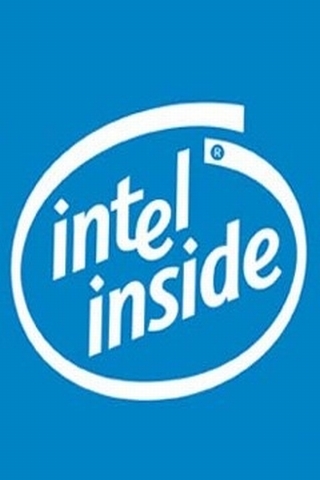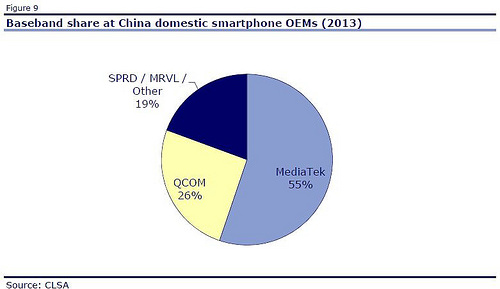Analyst: Intel Should Buy An ARM Chip Company
According to RBC Capital Markets analyst Doug Freedman, Intel’s current mobile strategy isn’t working, since most OEMs and device customers don’t seem to be too interested in Intel’s x86 chips for mobile. One solution that could see the company owning a significant portion of the mobile chip market quickly would be to buy an ARM chip maker such as Mediatek.
Mediatek has been a rising star in China’s mobile market over the past few years. It saw its market share double from 7.3 percent in 2007, to 14.4 percent in 2013, and it doesn’t show signs of slowing down.
In fact, Mediatek represents an increasing threat to Qualcomm globally, and it's already dominant in China because of its lower-priced processors for low- and mid-range mobile devices. Qualcomm has had to sell stock CPU cores from ARM just so it can match Mediatek's prices; otherwise, Qualcomm’s low-end chips would likely not be very competitive at that level of the market.
If Qualcomm is having a hard time pushing back on Mediatek’s growth, Intel's x86 CPUs -- which are barely present at all in the mobile market -- stand no chance at the low-end. Intel is used to higher profit margins on its chips, and having a low chip volume in the market also means its R&D costs are high compared to the revenue the company gets in return for it.
"Instead of Intel continuing to spend $4 billion-$6 billion a year to enter the market (higher end of spending range as it achieves success), hypothetically, an acquisition of MediaTek may reallocate Intel's best-in-class under-utilized fabs and financial resources to a rising star in the SoC world, solidifying MediaTek's market position," Freedman said.
Doug Freeman thinks that Intel could use the billions of dollars it spends every year to gain small percentage of the mobile chip market to acquire Mediatek instead and thereby could potentially get 30 percent of the market within another seven years. That doesn’t sound like a very exciting goal for Intel, given the expected timeframe, but it’s probably the best Intel could hope for right now.
The only problem is Intel is not particularly fond of the idea that it should be making ARM chips because the company thinks that will seriously undermine its still very profitable x86 business -- which could be a well-founded fear.
Get Tom's Hardware's best news and in-depth reviews, straight to your inbox.
As Intel would need to keep raising the performance of its ARM/Mediatek chips to stay competitive with others in the market, it would also slowly make its x86 chips less and less relevant in more product categories (tablets, slim notebooks, low-end PCs, etc) where those ARM chips could be used.
Intel could also intentionally try to keep its ARM chips at the low-end of the market, just as it tried for years with Atom, so that it doesn’t get into low-end notebooks and cannibalize its Core i3 series of chips. However, that would be a mistake, as it would only make Intel's ARM chips less sought after in the market, and the competition would take Intel’s place in those products, anyway.
The idea that Intel should buy an ARM chip maker like Mediatek is certainly one that Intel should seriously consider, and indeed the company may well have already. But Intel also needs to remember that it owned an ARM division before (XScale), and that didn’t end very well. Before it goes ahead and buys yet another ARM company, Intel needs to figure out a strong strategy and how it can avoid repeating the mistakes that led to the failure of the Xscale division.
Follow us @tomshardware, on Facebook and on Google+.
Lucian Armasu is a Contributing Writer for Tom's Hardware US. He covers software news and the issues surrounding privacy and security.
-
therogerwilco This is freaking blasphemy!Reply
The ATOM is better than ARM garbage. When will people learn. -
Haravikk This seems a bit premature; Intel's mobile strategy is only really just taking off, as Broadwell is the first generation that's going to really deliver on the efficiency and size improvements needed to reach the tablet market. If that's a flop then sure, sound the death bell for Intel in the mobile market, but while some of their past chips have been okay, their future offerings look very promising on both a performance and efficiency standpoint.Reply -
edlivian ReplyThis is freaking blasphemy!
The ATOM is better than ARM garbage. When will people learn.
on straight out performance its currently equal to high end smartphone socs, but battery life is miserable compared to arm socs. -
dgingeri They (Intel's management) better not hear of this. They'll probably engineer buying out ARM itself.Reply -
ivyanev If intel decide they want ARM processors - they can manufacture them if they want. But when the trend is - more power, more battery(capacity not life) what is the point when customers want powerful CPU and x86 can deliver.Reply -
icemunk Why would they do that? This analyst seems to be out-of-touch. Intel is rapidly pushing into mobile, and within the next 6-12 months will have a huge lead on ARM chips. Note the $100 intel Z3740s Windows 8 tablets popping up - these are faster than the most ARM android tablets, and Intel is just warming up.Reply -
InvalidError Reply
The IGPs in Intel's current SoCs are still horrible jokes though and Intel will not have anything worth writing about in that department until late-2015.14007258 said:Note the $100 intel Z3740s Windows 8 tablets popping up - these are faster than the most ARM android tablets, and Intel is just warming up.
Once Intel stops slacking off on the IGP, things could definitely get scary. -
ddpruitt x86/64 will never be able to compete in the mobile space. The architecture has become so large and complicated that it can be made to run at the efficiency of ARMs architecture. Most of the power in big x86/64 systems comes from the fact that compilers and code have been optimized to take as much advantage as possible. The problem is the rules aren't the same for the mobile space and the same techniques used to give killer performance at the high end (massively superscalar, complex cache systems, etc) hurt performance for smaller devices. Atom is to ARM as AMD is to Intel, the performance is subpar but people use it because they can get it cheap. Intel can get there but their attempts seem half-hearted at best.Reply

